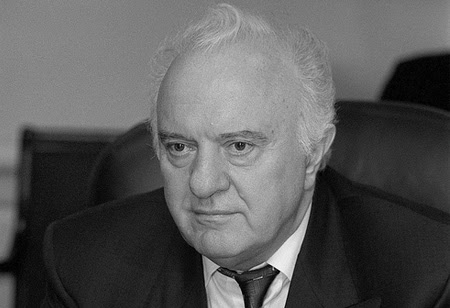Georgia’s second President Eduard Shevardnadze dies

Georgia’s ex-President Eduard Shevardnadze has died in Tbilisi today.
Members of his family confirmed Georgia's second President passed away earlier this afternoon at his Tbilisi house after a long illness. He was 86 years old.
Born in 1928 in Mamati village in Guria region, Western Georgia, Shevardnadze held leading posts in Georgia and in the Soviet Union for more than 30 years.
In 1985 he became Foreign Minister of the Soviet Union under leader Mikhail Gorbachev. In 1992 he became the head of state of the newly independent republic of Georgia. In 1995 he was elected as the second President of Georgia and resigned in November 2003 after the Rose Revolution.
"I'm going home", was probably one of the last statements the then-75 year old told journalists as the President of Georgia after Rose Revolutionaries broke into Parliament and forced him to leave in 2003.
After this he began to write his memoirs, which were filled with many interesting memories.
He was born in the Mamati village and studied at Tbilisi Medical School, as his parents wanted him to become a doctor. He graduated from Kutaisi Pedagogical Institute.
His political activity started in 1946 when he joined the Communist Party and with hard work and commitment, he jumped up the ranks inside the party.
In 1972 he became Secretary of the Central Committee of the Communist Party of Georgia and as a Communist Party official, he led a large scale campaign against corruption and dismissed a large number of officials.
As the President of Georgia he was often criticized for being unable to tackle pervasive corruption.
From 1985 to 1990, as the Soviet Foreign Minister, Shevardnadze contributed to the transformation of Soviet foreign policy. In this sense he played a key role in the fall of the Berlin Wall which ended World War II.
Shevardnadze supported Mikhail Gorbachev in his initiatives, like Perestroika and Glasnost, but in 1990 he unexpectedly resigned and left the party. Then he briefly returned as the Minister of Foreign Affairs but resigned within a month as the Soviet Union collapsed.
Shevardnadze returned to Georgia when the country was shaping as an independent state. He managed to win respect for his moves during the conflicts in the breakaway region of Abkhazia in 1992-1993.
However he could not win the war - which lasted for 13 months and 13 days - which resulted in ethnic cleansing of Georgians and numerous reported human rights violations by both sides. About 20,000 civilians died during the war, more than 250,000 refugees were left homeless, and about 2,000 are considering missing.
Shevardnadze was elected President in 1995 and re-elected in 2000. He was considered a pro-Western and democratic leader but under his rule, the country was poor. Corruption, irregular electricity supply and economic stagnation remained a problem.
However, Shevardnadze signed an agreement for a strategic partnership with NATO and allowed the construction of the Baku-Tbilisi-Ceyhan oil pipeline that was highly profitable for Georgia and ensured global energy security.
Shevardnadze's career as Georgian President was in some respects even more challenging than his earlier career as Soviet Foreign Minister. He faced many enemies, some dating back to his campaigns against corruption and nationalism in Soviet times.
Several assassination attempts were mounted against Shevardnadze. He escaped an assassination attempt in Abkhazia in 1992 when Russian military carried out an attack on Shevardnadze's life.
Then in August 1995 and February 1998 which his government blamed on the ex-security minister Igor Giorgadze and the remnants of the country’s first President Zviad Gamsakhurdia's party, respectively.
Neutralizing of the Mkhedrioni, a paramilitary group and political organisation outlawed since 1995, was also tightly connected with Shevardnadze’s name. The group relied on illegal sources of income. Its members were often accused of criminal activity, extorting "protection money" from businesses in areas which they effectively controlled, operating roadblocks where drivers would be "fined", smuggling drugs and committing robberies. By 1991, the Mkhedrioni was claimed to have had about 1,000 fighters and 10,000 associate members across the country.
Thanks to Shevardnadze, Georgian people gained a courageous victory over the Soviet repressive machine in maintaining the Georgian language as the country’s official language in 1978. This was an unprecedented case when the regime withdrew and backed down to the community’s demands.
Georgia's current currency, Lari, was adopted when Shevardnadze led the country. Lari replaced the Russian ruble on 5 April 1993.
On November 2 2003, Georgia held a Parliamentary election that was widely recognised as unfair by international election observers. This resulted in massive demonstrations led by the opposition and its leader Mikheil Saakashvili. Demonstrations would later be named the Rose Revolution.
On November 23, opposition protesters broke into Parliament and cancelled the newly elected Parliament’s session. Two weeks later Shevardnadze resigned.
"I am a kind of man who adapts easily to any situation. But what happened on 23 November was unexpected. This shouldn't have happened to me. I should have been better prepared. I should have known what they were trying to do and what they were preparing for”, Shevardnadze told BBC two years after the Rose Revolution.
Since 2003, the former President lived a quiet life in the diplomatic quarter, in Krtsanisi Residence above Tbilisi.
 Tweet
Tweet  Share
Share